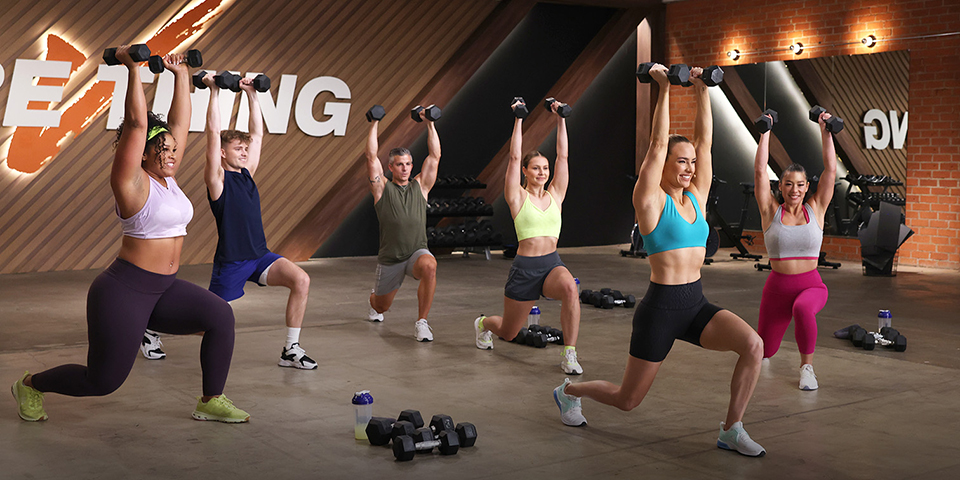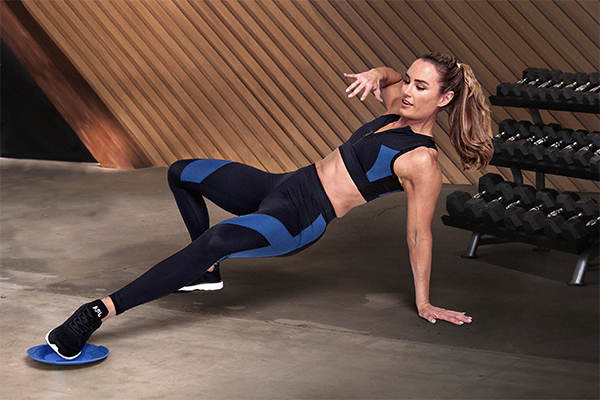If your fitness strategy is “showing up and hoping for the best,” it’s time to rethink your approach. Without a clear plan, one of two things is bound to happen: You’ll hit a plateau and stop seeing results, or you’ll overtrain, which can lead to burnout and injuries.
When a fitness pro creates a plan for a client, they often use a concept called periodization, which divides a long-term training plan into phases or cycles.
“There are four main types of periodization: linear, undulating, block, and conjugate,” says Trevor Thieme, C.S.C.S., Beachbody’s executive director of nutrition and fitness content. “They’re all based on the same principle and goal: varying your training volume and intensity over time (typically several months to a year) to avoid plateaus, maximize adaptation, and optimize your progress.”
For example, Sure Thing with Megan Davies incorporates periodization training — or “Type Training,” as she calls it — as the basis of her latest program.
If you’re following a periodized training program, some phases might focus on hypertrophy (muscle growth), while others might be designed to promote power or muscular endurance.
These constant, carefully calculated variations ensure that you continue to adapt and reduce your risk of hitting a plateau.
Undulating periodization is one type of periodization that is becoming particularly popular.
Here’s what you need to know about it to maximize your results.
What Is Undulating Periodization?
The classic approach to periodization is the linear model.
“You basically reach for heavier weights every few weeks, progressing from low weight/high reps (muscular endurance) to high weight/low reps (strength),” says Thieme. “Another way to think about it is progressing from a high training volume at a low intensity to a low training volume at a high intensity.”
Undulating periodization takes a different tack.
“You vary your training volume and intensity on a daily or weekly basis,” Thieme explains. “So, one week your focus might be strength, and the next it might be endurance, for example.”
If you were to use a graph to map out your training variables, they would undulate (go up and down) over time instead of being linear (a straight line).
“One of the advantages undulating periodization has over linear periodization is that it helps provide variety in the short term, busting workout boredom and monotony, and fueling motivation and consistency,” Thieme adds.
How to Use Undulating Periodization
Creating a periodized training plan requires a deep knowledge of training principles and how to apply them to achieve a desired goal while also taking into account lifestyle, fitness level, and scheduling constraints.
If you’re looking for an approachable fitness program that utilizes undulating periodization and can be tailored to your fitness level, check out Sure Thing.
Undulating periodization is the foundation of Sure Thing, Thieme explains, but the trainers at Beachbody put their own spin on it.
“We call our approach ‘Type Training’,” he says. “During the eight-week program, you’ll alternate between endurance weeks, which target your endurance-oriented type I muscle fibers, and power weeks, which focus on your larger, stronger type II muscle fibers.”
“Every fourth week is dedicated to ‘functional recovery,’ in which you’ll perform workouts that combine training principles from the other weeks and emphasize mobility,” Thieme adds. “The result is a comprehensive, results-driven training program that is as much fun as it is effective.”
Sure Thing consists of five 30- to 45-minute workouts per week, plus straightforward guidance on nutrition and supplements.
To get started, you’ll need light, medium, and heavy dumbbells, as well as Strength Slides.
A periodized training plan can help you optimize progress and avoid plateaus, burnout, and overuse injuries.
Join BODi to get access to Sure Thing and experience the benefits of undulating periodization — and feel stronger than you’ve ever been.









